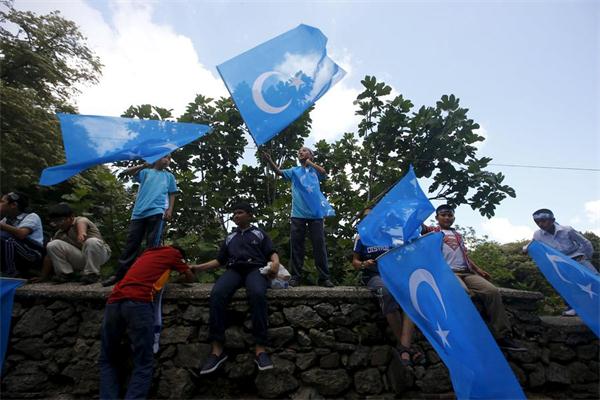 |
|
Boys wave East Turkestan flags during a protest against China near the Chinese Consulate in Istanbul, Turkey, July 5, 2015. [Photo/Agencies] |
Following a protest in Istanbul on Saturday against the alleged "mistreatment of Muslim Uygur people in China", China's embassy in the Turkish capital Ankara has warned its residents traveling in the country to be careful and stay away from the protestors. A group of Korean tourists were reportedly mistaken as Chinese and attacked by the protesters outside the Topkapi Palace.
The anti-China protests are believed to be linked with some Western media's reports that the Chinese government had restricted Muslim Uygurs, the majority of whom live in Northwest China's Xinjiang Uygur autonomous region, from praying and fasting during the holy month of Ramadan.
Although the reports were false, they went viral on some social network sites such as Facebook and Twitter when Ramadan began on June 18, leading to online accusations of China restricting ordinary Muslims from observing Ramadan.
But the truth is, the Xinjiang government convened a special meeting to ensure Muslim people's religious activities during Ramadan were not disturbed. China's Foreign Ministry also asked Chinese tourists to respect religious customs when traveling in Muslim countries in the same month.
Another important fact should also be noted. Six years ago on July 5 the riots in Urumqi of Xinjiang left 197 dead. It should not come as a surprise that some extremists in Turkey would choose the day to generate chaos and vent their anger towards innocent Chinese citizens, especially when the reports about China's "restrictions" emerged.
The allegations were either malicious rumors or a vicious attempt to spoil China's national solidarity and tarnish its image. They might also have been intended to serve as a convenient excuse for some extremists to use violence, in a bid to hamper China's Belt and Road Initiative from entering Islamic states such as Pakistan.
China is home to at least 23 million Muslims nationwide, most of whom belong to the Hui and Uygur ethnic groups.
While Muslims in other regions of China had their traditional fasting during Ramadan, it would be hardly convincing that Xinjiang was selected out to ban traditional religious practices.
Moreover, as many observers have noticed, Turkey's domestic politics have a lot to do with the recent unrest in Istanbul. Turkey is now undergoing a rise in nationalism, which has helped the radical Nationalist Movement Party become the third-placed party in the legislative elections in June.
Adopting a conservative religious approach, the ruling Justice and Development Party is largely responsible for the rise of the radical religious sentiments and the NMP, which is suspected of being the key organizer of Istanbul's anti-China protests.
Although it claimed to forbid the over 200,000 Chinese Uygurs in Turkey from participating in anti-China activities, the Turkish government turned a blind eye to them. This will create fissures in the China-Turkey relationship that has remained stable and healthy over the past years.
Being members of the G20, both countries have pursued close cooperation in global and regional governance. Turkey became a dialogue partner of the Shanghai Cooperation Organization two years ago, and confirmed the purchase of China's HQ-9 air defense missile system in March. Also, high-level exchanges will be brought to a new height in this year.
The Turkish government should not sit idle as anti-China extremists take to streets in Turkey. The bilateral relations should not be held hostage to ill-intentioned rumors.
The author is president of blshe.com and an expert in international relations studies.

I’ve lived in China for quite a considerable time including my graduate school years, travelled and worked in a few cities and still choose my destination taking into consideration the density of smog or PM2.5 particulate matter in the region.